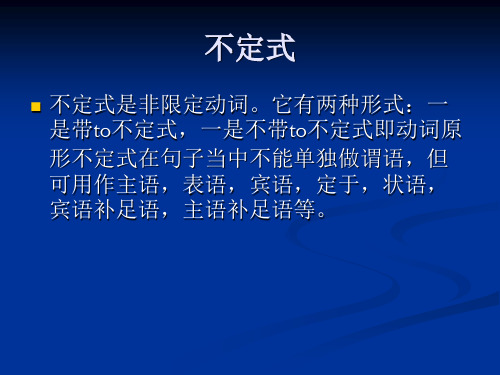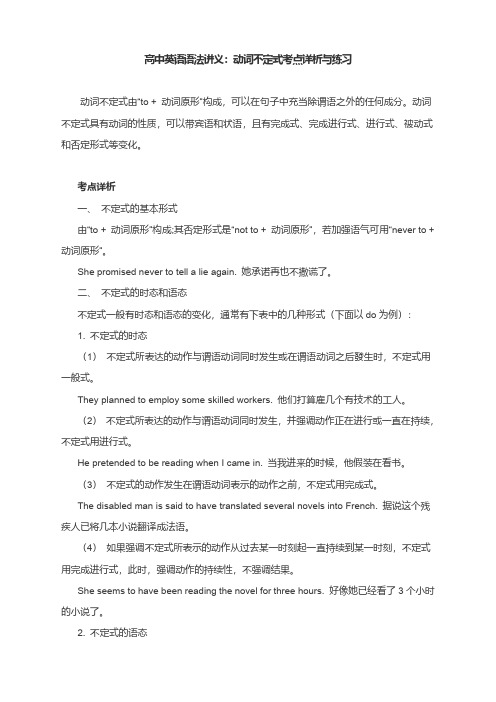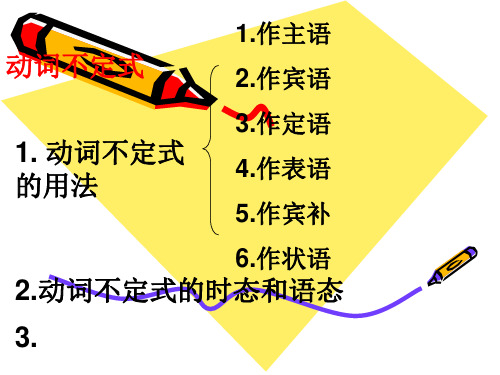高中英语动词不定式
高中英语语法不定式

不定式省略问 题
不定式省略问题 有时为了避免重复,省去不定式后面的内容,保留到不定式符 号to;如果是to be , 保留到be;如果是to have done , 保 留到to have。
A —— Would you like to go to his party ? —— Yes,I’d like to.
动词不定式的时态和语态
一般式: 动词不定式表示的动作与谓语动词 表示的动作同时发生或在谓语动词之后发生。 He seems to know this. 同时 I hope to meet you again. 之后
进行式:动词不定式表示的动作和谓语动词表 示的动作同时发生,并强调动作正在进行。
He pretended to be sleeping when I came in.
I’ve got a letter to write. He needs a room to live in. (2)序数词后作定语 She likes to listen to Mr. Li’s lessons , so she is always the first to come and the last to leave. (3)the only 后作定语 (4) 最高级后作定语
作宾语补足语: He asked me to do the work with him.
接不定式作宾补的动词有 aswk isahllofworcpeermit order tell advise expect beg invite encourage persuade etc.
* 在 feel hear, listen to have let make have see, watch , look at, notice, observe等词后面的 宾语补足语如果是不定式,要省略 to, 被动语态时 必须加上 to
高中英语不定式语法

非谓语动词在高中英语中,非谓语动词包括动词不定式(to do)、动名词(-ing)、现在分词(-ing)与过去分词(-ed)三种形式,它们有不少共同特点:①在句子中不能充当谓语,不受主语人称和数的限制;②保留部分动词特性:可以后接宾语,可用副词修饰;③否定形式,都是在其前面加上not/never等否定词;④表示的动作,如果明显发生的谓语动词表示的动作之前(或者强调先后),要求用完成时态形式;⑤都不能作地点状语,只有动词不定式可以作目的状语;⑥没有主语,其表示动作的执行者叫作“逻辑性主语”(主动语态时),有时表示动作的承受者(被动语态时)非谓语动词可充当句子的很多成分,并且有时态和语态的变化如下:Ⅰ动词不定式定义:动词不定式是非谓语动词的一种,它没有人称和单复数的变化,在句子中不能独立作谓语,但它仍保持动词的特点,可以有自己的宾语和状语。
一、不定式的时态和语态:1. 动词不定式的时态1). 一般式:当不定式表示的动作或状态发生几乎同时或晚于谓语动词表示的动作或状态时用一般式;eg. ①He seemed to be tired.②The building to be finished next month is for our teachers.2). 进行式:当不定式表示的动作或状态与谓语正好同时发生时,用进行式。
eg. ①When I went to his home, he happened to be traveling around the world.②I didn`t expect you to be working in such bad conditions.3). 完成式:当不定式所表示的动作或状态明显发生在谓语动词之前,用完成式;eg. ①He is said to have written a novel about the Long March.②He is said to have been taught French when he was a child.4). 完成进行式:如果不定式表示的动作发生在谓语动词之前,强调一直在进行或有可能继续进行,用完成进行式.eg. ①We are happy to have been working with the experts all the month.②I suspected him to have been playing instead of studying.5. 不定式的语态:1)当不定式的逻辑主语是其表示的动作的执行者时,一般要用主动式;eg. ①The workers are to build the great bridge.当不定式的逻辑主语正好是其表示的动作的承受者时,一般要用被动式(to be done).eg. ①The great bridge is to be built by the workers.2) 若是明显发生在谓语动作之前,而且含有被动含义,就用完成被动式( to have been done).eg. ①He is said to have written a novel about the Long March.②He is said to have been taught French when he was a child.二、不定式的功能:1. 不定式做主语:不定式做主语一般表示具体的某一次动作,而动名词doing 表示习惯的,经常的动作。
高中英语动词不定式(共26张PPT)

Because of the recent accident, our parents forbid my brother and me from swimming in the river unless someone agrees to watch over us.
Her husband can do everything except cook.
He wanted nothing but to stay there. 注意:如果but 或except 之前有实义动词do 的限定性
是或非限定形式,其宾语为不带to的不定式,否则为 带to的不定式。 Lots of empty bottles were found under the old man’s bed. He must have done nothing but ____ (drink) I thought you had planned to pradcrtiincekpiano today. “I did nothing but___ letters all day.”
careless,,clever,good,foolish,honest,kind,lazy,nice,right,silly, stupid,wise,等表示赞扬或批评的形容词,不定式前的 sb.可作其逻辑主语。
It is better to die on one’s feet than ____
A. to write B. write C. writing D. wrote
5、不定式(短语)做宾语补足语
在复合宾语中,动词不定式可充当宾语补 足语,如下动词常跟这种复合宾语:want, wish, ask, tell, order, beg, permit, help, advise, expect, encourage, persuade, allow, prepare, cause, force, call on, wait for, invite.,observe, intend, press, remind warn, lead, command 等, 如:
高中英语动词不定式

动词不定式不定式知识点综述不定式知识点综述1.不定式的基本形式 1. 不定式词作主语句型 1. 省略 to 的不定式作宾to do, to be done 2. 识记用不定式作宾语语补足语动词“五看to be doing; to have done, 的动词三使两听一感”to have been done 3. 跟动名词作宾语差别 2. 不定式作目的、结果2. 否认式组成状语2、不定式重难点解说重难点 1:动词不定式的时态语态动词不定式 (infinitive) 两种形式:一种是“to + 动词原形”组成( to- infinitive );另一种是不带 to 的不定式 ,即动词原形 (bare- infinitive) 。
动词不定式有一般式、进行式、达成式、完成进行式四种时态变化形式,一般式和达成式有被动语态变化形式。
主动语态被动语态一般式to do to be done进行式to be doing达成式to have done to have been done达成进行式to have been writinga. 不定式的时态是以句中谓语动词的时间为依照的:(1)一般式表示的动作或状态往常发生在谓语动词以后或同时发生。
例:They made plans to live in Paris.他们计划住在巴黎。
(to live发生在made plans以后)( 2)进行式表示其动作正在进行,与谓语动词发生的动作同时进行。
例: He pretended to be listening to me carefully.他假装仔细地听我讲。
(3)不定式的达成式所表示的动作或状态发生在谓语动词所表示的动作以前。
例: I am sorry to have kept you waiting.对不起,让你久等了。
(to have kept 发生在 I am sorry 所表示的时间以前)(4)不定式的达成进行式表示动作在谓语动词以前发生,并且向来进行着。
高中英语动词不定式的基本用法

高中英语动词不定式的基本用法1. 什么是动词不定式?动词不定式是动词的一种形式,在句中充当名词、形容词或副词。
它通常由“to”加上动词原形构成。
例如:to eat、to sleep、to study。
2. 动词不定式作名词动词不定式作名词时,可以做主语、宾语、表语或宾补。
- 作主语:To travel is my dream.- 作宾语:I want to learn English.- 作宾补:She asked me to help her.3. 动词不定式作形容词动词不定式作形容词时,通常修饰名词或代词。
- 修饰名词:I have a book to read.- 修饰代词:There is nothing to worry about.4. 动词不定式作副词动词不定式作副词时,通常修饰动词、形容词或副词。
- 修饰动词:She went to the park to play.- 修饰形容词:He is too tired to continue.- 修饰副词:She runs fast to catch the bus.5. 动词不定式与其他句型的搭配动词不定式与其他句型可以有不同的搭配方式。
- 动词不定式与情态动词搭配:I can't wait to see you.- 动词不定式与感官动词搭配:I heard him sing.- 动词不定式与使役动词搭配:She made me clean the room.6. 动词不定式的否定形式动词不定式的否定形式是在“to”前加“not”,构成“not to + 动词原形”。
- I decided not to go to the party.7. 动词不定式的完成式动词不定式的完成式是在“to”前加“have”,再加动词的过去分词形式。
- I'm glad to have met you.以上就是关于高中英语动词不定式的基本用法的完整版,希望能对您有所帮助。
高中英语语法讲义:动词不定式考点详析与练习

动词不定式由“to + 动词原形”构成,可以在句子中充当除谓语之外的任何成分。动词 不定式具有动词的性质,可以带宾语和状语,且有完成式、完成进行式、进行式、被动式 和否定形式等变化。
考点详析 一、 不定式的基本形式 由“to + 动词原形”构成;其否定形式是“not to + 动词原形”,若加强语气可用“never to + 动词原形”。 She promised never to tell a lie again. 她承诺再也不撒谎了。 二、 不定式的时态和语态 不定式一般有时态和语态的变化,通常有下表中的几种形式(下面以 do 为例): 1. 不定式的时态 (1) 不定式所表达的动作与谓语动词同时发生或在谓语动词之后發生时,不定式用 一般式。 They planned to employ some skilled workers. 他们打算雇几个有技术的工人。 (2) 不定式所表达的动作与谓语动词同时发生,并强调动作正在进行或一直在持续, 不定式用进行式。 He pretended to be reading when I came in. 当我进来的时候,他假装在看书。 (3) 不定式的动作发生在谓语动词表示的动作之前,不定式用完成式。 The disabled man is said to have translated several novels into French. 据说这个残 疾人已将几本小说翻译成法语。 (4) 如果强调不定式所表示的动作从过去某一时刻起一直持续到某一时刻,不定式 用完成进行式,此时,强调动作的持续性,不强调结果。 She seems to have been reading the novel for three hours. 好像她已经看了 3 个小时 的小说了。 2. 不定式的语态
高中英语知识点归纳动词不定式的用法和结构

高中英语知识点归纳动词不定式的用法和结构动词不定式是英语中的一种非谓语动词形式,由动词原形加上to构成。
它可以充当名词、形容词或副词,具有时态、语态和语气的特点。
在高中英语学习中,动词不定式的用法和结构非常重要。
本文将对其进行归纳总结。
一、动词不定式作主语动词不定式可以充当句子的主语,常见的结构有:1. It + be + 形容词 + 不定式作主语例如:- It is important to learn a foreign language.学习一门外语很重要。
- It is necessary to finish the task before deadline.在截止日期之前完成任务是必要的。
2. 不定式结构作主语例如:- To travel around the world is my dream.环游世界是我的梦想。
- To study hard is the key to success.努力学习是成功的关键。
二、动词不定式作宾语动词不定式可以作及物动词的宾语,常见的结构有:1. 动词 + 不定式作宾语例如:- I want to go shopping this weekend.这个周末我想去购物。
- She decided to take a break and relax.她决定休息一下,放松一下。
2. 常见的动词有:agree, hope, promise, refuse, plan, learn, wish等。
三、动词不定式作补语动词不定式可以作宾语补足语,常见的结构有:1. 动词 + 宾语 + 不定式作补足语例如:- They made him work overtime.他们让他加班工作。
- We find it interesting to solve puzzles.我们发现解谜很有趣。
2. 情态动词 + 动词原形作补足语例如:- He can't afford to buy a new car.他买不起新车。
高中英语动词不定式的用法---完整版课件

巩固练习
1. Several of these washes and dryers are out of order and__D____.
A.need to be repairing B. repairing is required of them C. require that they be repaired. D. need to be repaired. 解析:and并列谓语动词, need to be repaired相当 于need repairing.
动词不定式
1.作主语 2.作宾语
1. 动词不定式 的用法
3.作定语 4.作表语 5.作宾补
6.作状语
2.动词不定式的时态和语态
3.
1. 动词不定式作主语 动词不定式作主语,谓语动词用第三
人称单数。
To get there by car will take a whole day.
How to get enough money is still a question.
2.— I wish you had brought your family with you.
— I’ll get them ___B____ next time.
A. coming
B. to come
C. come
D. have come
解析:使役动词get后跟带to的动词不定 式作宾补,let,make, have后跟省to的 动词不定式作宾补。
What I would suggest is to start work at once.
注:在某些句型中,当主语部分有动作 动词do 时,作表语的不定式可以省略符 号 “to”,如:
- 1、下载文档前请自行甄别文档内容的完整性,平台不提供额外的编辑、内容补充、找答案等附加服务。
- 2、"仅部分预览"的文档,不可在线预览部分如存在完整性等问题,可反馈申请退款(可完整预览的文档不适用该条件!)。
- 3、如文档侵犯您的权益,请联系客服反馈,我们会尽快为您处理(人工客服工作时间:9:00-18:30)。
—动词不定式一、动词不定式的特征和种类动词不定式是由不定式符号to+动词原形构成,在某些情况下to也可省略。
A.不定式的一般式不定式的一般式表示的动作通常与主要谓语的动作同时或几乎同时发生,或是在它之后发生。
He appears to be very happy. 他看起来好像很高兴。
(同时发生)To catch the train, we'd better hurry to the station by taxi. 为了赶上火车,我们最好赶紧乘出租车去车站。
(to catch the train发生在hurry to the station之后)B.不定式的进行式不定式的进行式表示正在进行的或与谓语动词同时发生的动作。
It happened to be raining when I got there. 我到达那里的时候,天碰巧在下雨。
C.不定式的完成式不定式的完成式表示的动作在谓语表示的动作之前发生。
I'm sorry to have lost your key. 我很抱歉把你的钥匙弄丢了。
D.不定式的完成进行式不定式的完成进行式表示的动作在谓语之前发生并且一直进行着。
He was said to have been living in London for twenty years. 据说他在伦敦一直住了20年。
比较:不定式的时态意义。
He is said to be studying abroad. 据说他正在国外读书。
(不定式的进行式表示动作正在进行)He is said to have studied abroad. 据说他在国外学习过。
(不定式的完成式表示动作已经结束)E.不定式的被动形式当不定式逻辑上的主语是这个不定式表示的动作的承受者时,不定式一般要用被动形式。
不定式的被动形式根据其与谓语动作发生的先后关系,有一般式和完成时两种。
1.一般式 to be doneThese are the books to be given out to the students. 这些是要发给学生的书。
2.完成式 to have been doneThe novel is said to have been translated into many languages. 据说这部小说已被译成多种语言。
F. 不定式的否定形式不定式的否定形式由not或never加不定式构成。
We decided not to go out because of the bad weather. 由于天气不好,我们决定不出去。
注意:谓语动词的否定和不定式的否定不同的意义I did not promise to wake him up. 我没有答应叫醒他。
I promised not to wake him up. 我答应了不叫醒他。
二、动词不定式的用法|动词不定式除了不能单独作谓语外,几乎能担任句子中所有的句子成分。
A.动词不定式作主语不定式具有名词的特征,可在句子中充当主语。
1.不定式短语在句首作主语To say is one thing and to do is another. 说是一回事,做又是另一回事。
To love and to be loved is the greatest happiness one can get. 爱与被爱是一个人能获得的最大幸福。
2.用it作形式主语在很多情况下,人们通常用it作为形式上的主语,而把不定式移到谓语之后,使句子结构显得平稳一些。
It's rude to turn your back to your teacher and refuse to answer. 背对着老师,拒绝回答问题是不礼貌的。
注意:当主语和表语都是不定式时,不能用形式主语代替动词不定式。
To respect others is to be respected. 尊重别人就是尊重自己。
B.动词不定式作表语不定式作表语可以说明主语的具体内容或表示目的。
His wish is to become an astronaut. 他的愿望是成为一名宇航员。
注意:有些作表语的不定式,在结构上是主动的,但在意义上却是被动的。
She is to blame. 她应该受到责备。
C.动词不定式作宾语不定式可以充当部分及物动词的宾语,也可以充当but和except等介词的宾语以及形容词的宾语。
1.作动词的宾语①不定式可以充当部分及物动词的宾语。
Father likes to listen to music in silence. 父亲喜欢静静地听音乐。
必背:可接不定式作宾语的动词有:afford负担得起 agree 同意 aim以……为目标 ask 要求 attempt 尝试 begin 开始 care喜爱 choose决定 continue 继续 decide 决定 desire 要求 determine决心 expect 期待 fail不能 forget 忘记 hate不愿 hope 希望、manage设法 mean 打算offer表示愿意 plan 计划 prefer 宁愿 pretend 假装 promise 答应 refuse 拒绝 remember记起 try努力 want 想要 wish希望②在feel, find, make, think, consider等动词后,如果宾语带有宾语补足语时,人们常常用it作形式宾语,而把真实宾语放在宾语补足语之后。
I found it possible to work out the problem without a computer. 我发现有可能不用计算机而解出这道题目。
She made it a rule to get up at five. 她养成了五点起床的习惯。
③在表示“希望、打算”等动词(如hope, expect, intend, mean, want等)的过去式后,可接动词不定式的完成式来表示没有实现的动作。
I had intended to call on you. 我原想来拜访你的。
I had expected to meet him here last night. 我原以为昨天晚上能在这里见到他的。
We had meant to stay there a week. 我们原打算在那儿呆一个星期的。
2.作介词的宾语不定式可以作介词but和except的宾语。
He had no choice but to sit there as usual. 他没有什么选择,只好像往常一样坐在那儿。
There is nothing we can do but wait patiently. 我们只能耐心等待。
3.作形容词的宾语不定式作形容词的宾语有两种句型,一个是句子的主语是不定式的逻辑主语,另一个是句子的主语是不定式的逻辑宾语。
①句子的主语是不定式的逻辑主语。
这类形容词有able, afraid, angry, anxious, careful, clever, content, cruel, determined, disappointed, eager, foolish, fortunate, frightened, happy, impatient, glad, lucky, naughty, prepared, proud, ready, slow, shocked, sorry, surprised, willing等。
I am sorry to say that he is going from bad to worse. 很遗憾,他的情况每况愈下She was not content to live a quiet life in a small town. 她不满足在一个小镇里过默默无闻的生活。
②句子的主语是不定式的逻辑宾语。
这类形容词有easy, hard, cheap, expensive, dangerous, difficult, funny, fit, impossible, interesting, nice, pleasant, simple, strange, useful等。
This problem is easy to solve. 这个问题很容易解决。
The water is not fit to drink. 这水不适于饮用。
注意:在这种结构中,如果不定式是不及物动词,则必须加上结构或含义所需的介词。
The river is dangerous to swim in. 在这条河里游泳很危险。
A spring mattress is comfortable to sleep on. 席梦思床垫睡上去很舒服。
D.动词不定式作宾语补足语不定式可以在“主语+谓语+宾语+宾语补足语”句型中充当宾语补足语。
在这一句型中,宾语是动词不定式的逻辑主语。
1.在表示感觉的动词后作宾语补足语,并且不定式都不带to。
这类动词有:see, hear, feel, watch, notice, observe, look at, listen to等。
I heard them sing yesterday. 昨天我听见他们唱歌了。
注意:转为被动语态时,原不带to的不定式要变成带to的不定式。
notice和watch没有被动语态。
We saw the car stop. The car was seen to stop. 我们看见这辆车停了下来。
n2.在使役动词后作宾语补足语,不定式不带to。
这类动词有:make, let, have等。
转为被动语态时,其后通常都用带to的不定式(have没有被动语态)。
有些动词跟不定式作宾语补足语时省去了to,这些动词有:一感二听三让四观看。
一感:feel 二听:hear,listen to 三让:let,have,make 四观看:observe,see,watch.,look at What would you have me do 你要我做什么She made him give up smoking. 她让他戒了烟。
3.在表示心理状态的动词后作宾语补足语。
这类动词有:consider, think, believe, discover, find, imagine, judge, suppose, prove等。
这类动词后的不定式通常是“to be+形容词或名词”结构,think, consider, find后的to be常可省略。
We consider him (to be) a good teacher. 我们认为他是一个好老师。
